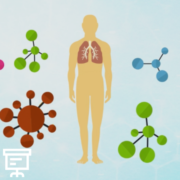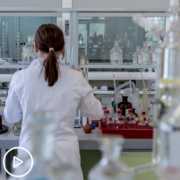How Genetic Testing Has Revolutionized Lung Cancer Treatment
How Genetic Testing Has Revolutionized Lung Cancer Treatment from Patient Empowerment Network on Vimeo.
Dr. Martin Edelman explains how genetic testing has revolutionized the lung cancer treatment landscape. Want to learn more? Download the Program Resource Guide here.
Dr. Martin J. Edelman is Chair of the Department of Hematology/Oncology and Deputy Director for Clinical Research at Fox Chase Cancer Center. More about this expert here.
View more from Fact or Fiction? Lung Cancer
Subscribe to stay up-to-date in the latest information in Lung Cancer treatment
Related Programs:

Lung Cancer Treatment Decisions: Which Path is Best for You? |

|

|
Transcript:
Patricia:
How is genetic testing changing the landscape?
Dr. Edelman:
So, genetic testing – and in this case the testing of the tumor, not the germline, not the individual – has been very, very crucial. If you go back about 20 years ago, there was a family of drugs called epidermal growth factor receptor inhibitors or EGFR inhibitors.
And the basic science at the time made it look like these would be best combined with chemotherapy in squamous cell carcinoma. And as it turned out, combined with chemotherapy they weren’t very useful. But as single agents, there were these occasional very dramatic results.
So, that came at a time when we were able to evaluate tumor DNA, sequence it with some degree of ease at a reasonable cost. So, there was a discovery of specific mutations, which were targeted by these drugs. So, it was sort of interesting in that it was the clinical observation that led to the discoveries in biology, not really the other way around.
But then that in turn resulted in looking for other mutations, which were found, and then the development of other drugs – in some cases, the repurposing of other drugs for those. And now we have about a half a dozen very validated targets, each one of which in a small slice of the population – between say 1 percent and 5 percent – 10 percent of the lung cancer population – but these – if the patient has within their cancer that particular mutation, these are drugs that are 80 percent-plus effective and frequently can be administered with relatively little toxicity.
And usually they’ll give them benefit for one-plus years or more. So, that’s been an example of progress there.






